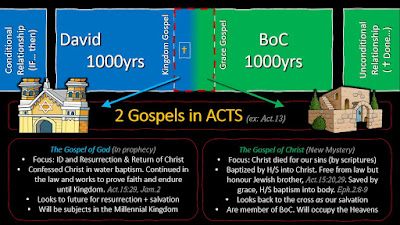OBS: God's Word is a Progressive Plan (Part.4)
OBS: God's Word is a Progressive Plan (Part.4)

We continue our journey through this lesson series, gathering evidence to clearly show the distinctions between the parts of God's great redemption plan for humanity and creation. Recall that any plan or project has a start and an ending and that between the start and end one would typically have actions or events that drive you to the goal or what you want to achieve, being the ending! Each of these parts of the plan are foundational actions or events that have a part in the whole, but although they relate to each other to form the whole, they don't necessarily relate to each other in their details, or maybe I can state that they don't have the same steps or materials or qualities.
For example, if you build a house, you MUST start with the foundation. You cannot start with the roof! It just does not make sense! The foundation, the walls and the roof are all part of the same project, but they are different parts of it and have very different actions, materials and purposes. Also, you cannot use materials from one part in another part. You cannot build the walls with the roof slates, and you cannot build the roof with the bricks! This also does not make sense and will case great problems in the overall quality and design of the house.
In the same way, God's Word, as a plan, has different parts, each with its unique purpose. They have different materials and different designs, yet they all form part of the same goal; to redeem humanity and restore creation. Just like you cannot mix materials in the house project, one cannot go about extracting scriptures from any and all parts and mixing them together and expect the plan to make sense and work. This is where we HAVE to recognize that the Word is divided and we HAVE to recognize the uniqueness and value of each separate part and keep them separate, since each has its own purpose and function.
This is the fourth part of the study. We can come through the primary divisions and even had a look at some more subtle divisions in the Word that prove these parts of God's plan. Let's continue looking at even more evidence to support this incredibly important view of rightly dividing the Word of truth (2 Tim.2:15). Let's put the spotlight of the earthly ministry of Jesus and prove that His 3-years on earth were focused on ministering to the Jews, to prepare them for their role (Ex.19:5-6) in God's master plan.
Jesus whole earthly ministry was under the law and was only for the Jews.
Jesus was born as a Jew, born during the prophetic period under the law, and born at the EXACT moment in time that was necessary for Him and designed for Him to impact the earth with His life and ministry.
To redeem the Jews
- Galatians 4:4 But when the fullness of the time had come, God sent forth His Son, born of a woman [in the flesh], born under the law, 5 to redeem [save] those who were under the law [Israel],
Just the phrase "in the fulness of the time", is significant to confirm the concept of periods in time which are unique to God's greater plan. Ask yourself, why didn't Jesus come before the great flood of Noah? Surely His life and dead could have saved countless people in that time! Well, it was not in God's sovereign design, and things were not ready for Christ during that time, not to mention that the greater part of humanity was tainted by foreign DNA from fallen beings!
Another proof that Jesus came only for the Jews is that His focus was only towards them. Please remember that Jesus came to fulfil a very specific role in God's greater plan, which was to save Israel and mature them as His priests and a holy nation (Ex.19:5-6) to be the vehicle to take His presence, His Word and His blessings to the Gentile nations. This was God's covenant promise to Abraham (Gen.12:1-4). God cannot go against His Word and promise, and it was always in His plan to use Israel in this way. So, Jesus earthly ministry was focused entirely on feeding the Jews (Matt.15:26), maturing them and preparing them to become the light to the Gentiles.
Have a look at this dialog between Jesus (Isa.49:5) and God the Father (Isa.49:6) before the foundations of the heavens and earth. I can imagine this as the planning of the blueprint of humanity and its redemption,
Jesus speaks to God the Father and confirms His role in the plan,
5 And now the Lord says,
Who formed Me from the womb to be His Servant,
To bring Jacob back to Him,
So that Israel is gathered to Him
(For I shall be glorious in the eyes of the Lord,
And My God shall be My strength),
Then God replies to Jesus and says something quite OUTSTANDING!!
6 Indeed He says,
It is too small a thing that You should be My Servant
To raise up the tribes of Jacob,
And to restore the preserved ones of Israel;
I will also give You as a light to the Gentiles,
That You should be My salvation to the ends of the earth.
Can you see the reference to the two programs here! Jesus will initially restore Jacob (Israel) unto God, but then God says that its too small a deed and that the life of Christ and His role in the plan should also extend to the Gentiles. WOWWWEEE!
However, back to where we are. At this point during Jesus earthly ministry, His purpose is NOT YET to be a light to the Gentiles! His current purpose is to restore Jacob unto God!
This is why Jesus says the following,
Go only to Israel
- Matthew 10:5 These twelve Jesus sent out and commanded them, saying: "Do not go into the way of the Gentiles, and do not enter a city of the Samaritans [mixed Jew/Gentile]. 6 But go rather to the lost sheep of the house of Israel.
- Matthew 15:24 But He [Jesus] answered and said, "I was not sent except to the lost sheep of the house of Israel."
It might sound strange to hear that Jesus only came for the Jews during His earthly ministry, but this is THE TRUTH! However, let me mention in the same breath that Jesus had a second ministry, a ministry from heaven, that was fulfilled through the life and ministry of Paul to the Gentiles. And the revelations given to Paul proclaim that the act of Christs cross work; His death, burial and resurrection, were the saving grace of the Gentiles. So, Jesus came for the Gentiles too, but its only the cross that is meaningful towards our salvation. The rest of Jesus 3-years of ministry was to the Jews and very much under the law, which meant little to the Gentiles of that time or forwards (2 Cor.5:16).
Jesus taught and promoted the law (which was relevant to Israel only)
- Matthew 5:17 Do not think that I came to destroy the Law or the Prophets. I did not come to destroy [the law and prophets] but to fulfil. 18 For assuredly, I say to you, till heaven and earth pass away, one jot or one tittle [a very small amount, dot or stroke] will by no means pass from the law till all is fulfilled. 19 Whoever therefore breaks one of the least of these commandments, and teaches men so, shall be called least in the kingdom of heaven; but whoever does and teaches them [the law], he shall be called great in the kingdom of heaven. 20 For I say to you, that unless your righteousness exceeds the righteousness of the scribes and Pharisees, you will by no means enter the kingdom of heaven.
It's interesting to know that as much of Jesus ministry was made up of promoting and fulfilling the law, Paul directly teaches us in this grace period that we are NOT under the law.
We are not under the law
- Rom 6:14 For sin shall not have dominion over you: for ye are not under the law, but under grace.
So, if we are not under the law then that which is under the law is not directed to us. Being under grace contains a WHOLE DIFFERENT set of instructions; the mysteries that are provided to us through Christs heavenly ministry through Paul.
The above evidence should provide more than enough proof that there was a strong division at this time in the biblical texts. Jews were distinct from Gentiles, Jesus focused on their preparations according to God's plan, and the Gentiles at this point were still hopeless and without God in the world (Eph.2:12). We should always take care to never mix up scripture and pull it out of context. Studying the Word rightly divided is a command given to Timothy (2 Tim.2:15), and it is a command to us in this day too.
Now look at what Paul writes in these two passages below. This is written in a different part of God's plan, a different dispensation, under grace and for a different group of people; not the Jews, but the Body of Christ; that is us who are saved under the grace gospel,
We know him thus no longer
- 2 Corinthians 5:16 Therefore, from now on, we regard no one according to the flesh. Even though we have known Christ according to the flesh, yet now we know Him thus no longer [in this manner, according to his Jewish heritage, according to the law].
In the above verse, Paul is not blaspheming. He is simply saying that as Gentiles we should not focus on the earthly ministry of Christ while He was in the flesh. Why not? Because that was for the Jews! We should focus on Christ's heavenly ministry, the gospel of grace, the mysteries (our doctrine), and of Christ within us, focusing on each other from a spiritual context, which is our real life (Col.2:17), where we are blessed with every spiritual blessing in the heavenly places in Christ (Eph.1:3) and where we are led by the Spirit within us (Rom.8:14) to do the good works (here on earth) to which God has predestined for us to do (Eph.2:10). We are not only heavenly minded, but we do also have earthly value as we apply our ministry of reconciliation and proclaim His good news of grace until He comes (2 Cor.5:18-20).
Grace and peace to you.
See the video of this lesson here.



Comments
Post a Comment